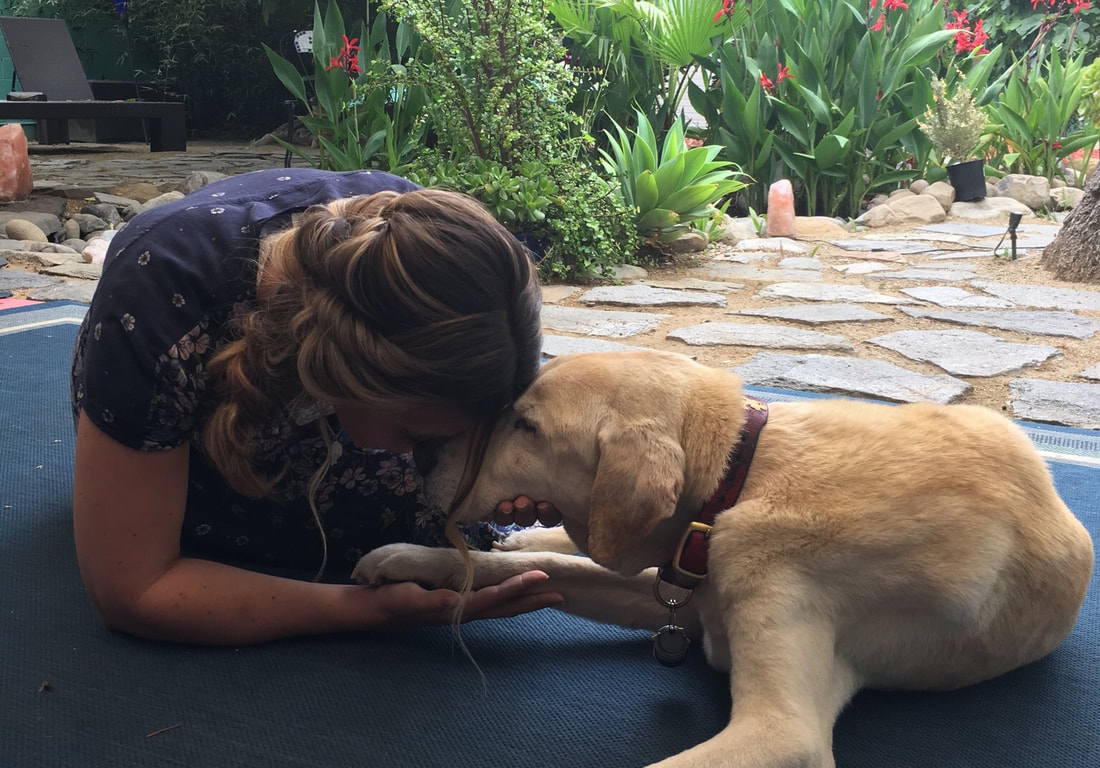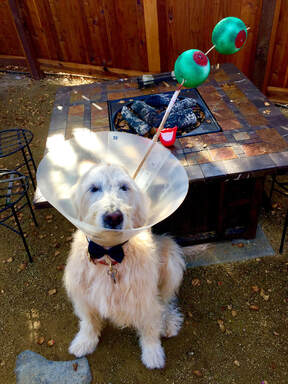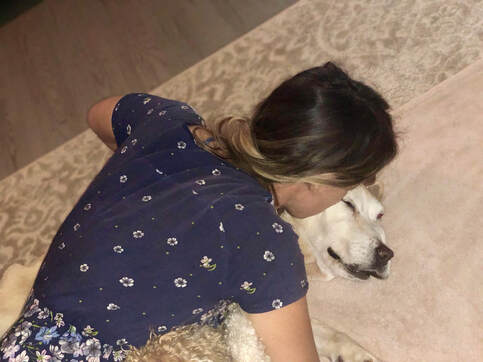|
The loss of a beloved pet can be the deepest heartbreak of our lives. With each article, we will address and answer a key topic with Certified Pet Grief Counselor, Pina De Rosa (APLB / AAVSB). If you wish to send in questions for Pina, please submit them to Pina De Rosa through www.PetBereavementCounseling.com In our last topic on Pet Grief Counseling, we addressed two holiday-related questions that I was asked recently. About dressing up pets in Halloween costumes: “What are your reflections and opinions about pet owners dressing up their animals? Is there any possible problem or potential danger in this behavior?” As well as how to counsel a pet parent who will not euthanize a terminally ill and suffering pet, because of Judeo-Christian religious reasons? With this topic, we get to look at why is it important for the bereft pet parent to be made aware of and understand the stages of bereavement? What is the difference between denial and disbelief? What about closure vs. resolution? It is important for the bereft pet parent to be made aware of and understand the stages of bereavement as it can support the newly bereft pet-owner in understanding that such overwhelmingly sorrowful emotions are to be expected. When a huge stable part of the pet parent daily life is abruptly ripped out, they are in a deep emotional state of shock. Often times they are not equipped to cope with their pet’s death. Even if they prepare themselves, they are rarely ready. It is helpful for the pet parent to understand that such overwhelming experience with grief and loss is something that most people experience when coping with a deep heart-wrenching loss. The length of grief is unpredictable, from a few days to a few weeks, or even longer. Understanding this, and the phases of mourning, can lessen any fear they may feel from such emotional trauma. The heartbreak they feel is so tragic, they may feel they need to endure it to no end. Understanding that the overpowering emotions they are feeling are normal can serve as a road map of the path ahead. People are often afraid of death, which can cause them to be afraid of feeling such unbearable new emotions. If they do not allow themselves to feel their true feelings, they end up causing even more psychological harm to themselves. It is beneficial to their healing process to know that the initial shock, denial and disbelief they feel are absolutely normal. And that letting out their tears is not a weakness, but a necessary part of healing. It is important to reassure them that vacillating between anger, alienation and distancing is a normal temporary response to the suffering they feel. It is often too hard for the bereft pet-owner to comprehend such loss. Letting them know that these stages are all normal during mourning, and that they are non-sequential, will help them cope with the vast scope of emotions. They may feel they are losing it, they are likely to feel guilt, and even experience some degrees of depression before they the get to a place of spiritual and emotional healing. Addressing them with understanding and compassion will help the bereaver make the journey towards that healing and resolution. It’s important to remember that as Megan Devine puts it best in her most excellent book “It’s ok you’re not ok – meeting grief and loss in a culture that doesn’t understand”, grief is not a problem that needs a solution, it is an experience that needs support. Her book, along with Dr. Wallace Sife’s book “The loss of a pet – a guide to coping with the grieving process when a pet dies” are both truly excellent sources of support. They also make wonderfully thoughtful gifts for our friends when their pets pass. It is also very important to note that at the beginning of the grieving experience, there is a difference between denial and disbelief. Each can affect a bereaving pet parent as follows. Denial and disbelief are two separate responses to the initial shock of the death of a dearly beloved pet. Denial is a mental reaction that occurs when the mind categorically refuses to accept something too painful to bear. It is a temporary psychological reaction that unconsciously switches off reality when the facts are too upsetting to accept. Disbelief is a conscious doubt to admit the fact that the pet has died. The client does not like that truth, is often stunned by it, and finds it most challenging to process it. Disbelief is always the first one to occur, followed by denial. Both are normal initial stages of mourning. Denial and disbelief usually are the briefest of all the stages of grief, both necessary to the process of grieving and healing. The difference between denial and disbelief is the following. Denial functions as an unconscious circuit breaker that is triggered when the stress is too extreme for the mind to bear. When a client is in denial they are in a fantasy that the pet is not really dead. They refuse to admit it. During disbelief, the client recognizes the truth, yet a part of them still does not want to embrace it nor believe it. When the client is in disbelief, they feel in a daze as the truth has not yet sunk in. Denial is a protective fantasy that shields the client from the initial shock. During denial the client not only avoids acknowledging their beloved pet’s death, but they also passionately hope and wish for their return. Fueled by that hope, they may sometimes “bargain” with God and they might even contact pet psychic. Once the initial shock subsides, and once the reality sets in, so does the pain. With the death of a pet there is no “closure” rather there is “resolution”. This is how we can help the bereft pet parent to work toward this stage? Resolution is the final stage of bereavement. It is the time when the client gets to keep the memory of their beloved companion, while being able to let go of the sharp pain and anguish they have been experiencing until now. It is when they learn to live with the pain of the loss. Resolution is the time when the client is able to shift from feeling like a victim to honoring their pet’s precious brief life. Those heartwarming memories allow the bereaver to experience a new depth of love for their special companion. We now use this term instead of “closure” because, in psychology, “closure” is usually related to finding a solution to a problem. That is not a good choice when applied in reference to the loss of a dear one. The concept of “closing” is utterly intolerable to an anguished pet-owner who has just lost their special companion. When the bereft client feels threatened by anything that might invalidate what they are going through, they are likely to close off and even walk away. Those are reasons why we use the term “resolution” instead of “closure”. We help the pet parents work toward this last stage by supporting them in realizing that they can be celebrants of their special companions’ lives. We help them also by reassuring them that it is normal that they will feel some of that pain in the future - even at seemingly random times. Like waves of the ocean that come and go, it is expected they will tear up again and again as they heal and continue their lives. There will not be a day that they do not miss their beloved companion. The grief counseling with a pet bereavement counselor will support them with healthy coping skills so that they learn to live with that hole in their heart, with the love and the loss finding a way to co-exist.
1 Comment
The loss of a beloved pet can be the deepest heartbreak of our lives. With each article, we will address and answer a key topic with Certified Pet Grief Counselor, Pina De Rosa (APLB / AAVSB). If you wish to send in questions for Pina, please submit them to Pina De Rosa through www.PetBereavementCounseling.com In our last topic on Pet Grief Counseling, we looked at “anticipatory grief”. With this topic, as the holidays are around the corner, we will address two questions that I was asked recently. About dressing up pets in Halloween costumes: “What are your reflections and opinions about pet owners dressing up their animals? Is there any possible problem or potential danger in this behavior?” My reflections and opinions about pet owners dressing up their animals is that if it is a once off special occasion like a fun Halloween costume, or a few cute moments with a Santa hat for a holiday photo, it can be quite sweet. If it is enjoyable for all (including for the pet), then there would not be much reason for concern. There are times when pet owners take care of their animals by dressing them up for warm weather or for rain protection, or even putting on a vest in the case of a service animal. In my opinion those are quite normal circumstances. That said, it is a distorted situation when the pet is dressed up in various costumes for multiple occasions, or even receives baby toys and gets carried around in a baby stroller (even though the pet is not disabled). It becomes quite strange when a pet owner relates to the animal the way we would relate to a human baby, and transfers any potential unmet nurturing needs to that pet. If this conduct is ongoing, it can become a significant issue and such pathology would then warrant appropriate professional help. That is an unhealthy fantasy. Sometimes the owner is aware of it, often times they are not. In such instances, there is quite definitely a possible problem or even potential danger. This type of behavior is a conscious (or sometimes unconscious) redirection of the feelings that a parent would have for a child. This would then quite often lead the owner to experience and express a heightened responsibility for the animal. In extreme cases, such as when the animal is pushed around in a stroller, then it is not only strange, but it can actually deprive the pet of living its true animal nature which is considered a form of abuse. Once that pet passes, the grief counseling for the pet owner will likely need to be referred for a longer and deeper therapy or psychotherapy. About religion: “How would you counsel a person who will not euthanize a terminally ill and suffering pet, because of Judeo-Christian religious reasons? Without criticizing their beliefs, how would you deal with a friend who thinks only God has any right to take a pet’s life? Some of our friends want our help, but they will accept only what they see as legitimate scriptural justification.” How I would counsel a person who will not euthanize a terminally ill and suffering pet, because of Judeo-Christian religious reasons is the following. Aware that a counselor’s “logical” approach will not be effective with someone who is deeply religious, I would bring up compelling religious references such as the biblical thought of “Man is God’s appointed steward of all living things.” Because some clients rely on their severe religious beliefs, they will decline having their pets euthanized, erroneously believing their faith forbids it. With that awareness, I would ensure to solely counsel them through their religious beliefs. I would never attempt to convince them of the inaccuracy of their of their beliefs as it would only alienate them. Without criticizing their beliefs, how I would deal with a friend / client who says only God has any right to take a pet’s life is the following. Firstly, I would actually ask them what kind of assistance they believe I may be able to offer. Then, with the awareness that their religious beliefs can often create rigidity in their thinking, I would ensure to not antagonize them. I would make certain to work with them solely from their religious perspective. Working with nothing else but that approach would be the best way to reach this kind of client and be of service to him/her. I would not expect that normal counseling techniques, or logic, would work in this very challenging type of case. I would also keep in mind that if they come to me for help, it is because even in the midst of their emotional turmoil, they desire being assisted. The following are several biblical or religious references or examples to justify my perspective with this troubled person who wants my help but will accept only what he/she sees as legitimate scriptural justification. Remembering that this person wants my help, but will accept only what he/she sees as legitimate scriptural justification, I would remind them of Genesis 22. It describes how Abraham was ready to sacrifice Isaac, his own son, to prove his faith. God sent an angel to instruct him to sacrifice a ram instead of Isaac. Hence Genesis 22 clearly demonstrating that God does not forbid the killing of animals. With this reminder, the client may be able to reframe euthanasia as an honorable act of mercy and compassion, just as God’s love advises, especially for terminally ill animals in pain. Another biblical reference that will help is the Old Testament commandment “Thou shall not kill” which, in most recent Bible editions, has been revised as “Thou shall not murder”. The first translation can be somewhat misleading. The latter is a more appropriate biblical Hebrew translation. Also a helpful Old Testament reference is when God reminds us of the Covenant to have a loving relationship with all His creatures. The Judeo-Christian theology is grounded in a God of love, a God who created and cares for all things in a loving way. After the flood, in Genesis 9:8:17, God shares His intention regarding that Covenant. “And God spake unto Noah, and to his sons with him, saying, Behold, I establish my Covenant with you, and with your seed after you; And with every living creature that is with you, of the fowl, of the cattle, and of every beast of the earth. This is a sign of the Covenant, which I make between Me and you and every living creature that is with you. For all future generations I set my rainbow in the cloud, and it shall be a sign of the Covenant between Me and the earth.” And more about the Covenant that God made with all living creatures, including animals, Jesus says in the New Testament: “Are not two sparrows sold for a cent? And yet not one of them will fall to the ground apart from your Father.” (Matthew 10:29) Through His Covenant, by making the humans the stewards of the animals, God gave us the sacred responsibility for them. These are some of the biblical references that will help counsel a troubled friend / client who wants help in seeing a legitimate scriptural justification they can accept.
The loss of a beloved pet can be the deepest heartbreak of our lives. With each article, we will address and answer a key topic with Certified Pet Grief Counselor, Pina De Rosa (APLB / AAVSB). If you wish to send in questions for Pina, please submit them to Pina De Rosa through www.PetBereavementCounseling.com In our last topic on Pet Grief Counseling, we looked at how to “welcome the ashes” home. With this topic, we get to look at “anticipatory grief.” As I have been in the process of writing a book for people who want to know how they can help their loved ones who are going through pet loss, I was asked the following question (by someone who never owned a pet): “Oh so basically you are writing a book on how people grieve?” The answer was no. Grieving a human loss and grieving the loss of a pet is not even comparable. Our pets see the truest part of who we are. Most pet owners will say it’s the purest form of unconditional love. They are like the angels of our souls. With our pets, we don’t need to *be* anything else. When they pass, the physical bond breaks it feels insurmountable to us. And not just the initial shock. Yes, we are grateful -so deeply grateful- to have had the gift of loving them for 3-5-8-15 years. And yet, if our 3-5-8-15 years old child died, we would not be expected to be at work on Monday. We would not be expected to be ok with the social media “time hops” constantly reminding us of the good times we had together. But somehow, with a pet, we are supposed to soldier on. We are to keep it together and not fall apart. All the while with not much support other than “time will heal”, or “sorry for your loss” and “she had a long life” types of platitudes. As you have been reading this series of articles, you know that support is available. And not just when the pet passes. What I mean is that oftentimes we know that the pet is about to pass, and we don’t know that we are experiencing something called “anticipatory grief”. Though our pets never “leave”, we dread the house feeling so empty and different without their physical presence. That is another reason why anticipatory grief is so very draining, and often times we don’t even know we are in it. I wish all bereft pet parents had access to loving/healthy processes during this most painful heartbreak. Unfortunately most people (including myself at the time) don’t know how the support of a pet bereavement session could even help. The other day one my clients, Kimberly, reached out to me saying her friend was having a hard time because her husky’s was scheduled to pass in a few days, and she wished to give her a gift certificate for a pet grief counseling session for “when the time would come”. One of the things I shared with Kimberly was that her friend was likely already experiencing anticipatory grief, which makes it even harder to be present with the ailing pet. The fact is pet grief counseling is not just for “when the time comes”. When the anticipatory grief takes over and your friend feels they are drowning in sadness, guilt and other overwhelming emotions, pet grief counseling would be very helpful. The following are a couple of initial suggestions is for the Kimberly’s of the world, the caring friends who want to help when death is imminent. Suggest to your friend that they tell their pet their adoption story - it’ll be soothing for both. Your friend can tell them their story like a bedtime story, gently sharing it with them every night. Going in all the details. Their beloved animal companion will hear that in their soul. It will be a very special time together, that deepens their bond even more. When your friend feels overwhelmed by sadness (or any other overwhelming emotion), invite them to imagine all the love in their heart going out to their pet’s heart. And imagining all the love in their pet’s heart going out to their owner’s heart. Imagining this continuous circle of love between the two hearts will be very helpful to navigate any overwhelming emotions. Relay this to your friend ~ you can put into your own words what my favorite Scott from www.AtGardensEdge.com shared so beautifully: “During your pet’s final days, just dedicate your time and energy to giving your beautiful dog all the love you can. After your pet passes, celebrate their life. Light some candles and incense...play spiritual music...invite loved ones over (and have them bring your favorite pizza and some ice cream) to say their goodbyes and grieve with you. There is no reason to rush through this deeply emotional process. If your dog passes away at home, don’t worry...Nothing is going to happen to your pet overnight. Just wrap them in an old sheet and get some rest. Call me in the morning. Keep peace and love in your heart.” Suggest to your friend to write a loving letter to their pet - a letter they can seal and give to the pet mortician after they pass, so their pet can be either buried or cremated with it. This letter can be a testament of so much that they love about their pet; it can include what they are thankful for and what they will miss about them. In that letter/envelope, they can include a small little something that belongs to them so that it will go “with your pet” (I’d recommend staying away from any plastic or metal objects as they’d likely compromise the ashes in the cremation process, but a section of a special blanket, a lock of your hair, a photo would surely work). Then, when the pet passes, your friend can ask the mortician to please include that envelope with their dearly beloved. Let them know there is nothing plastic or metal in it. The mortician will say yes. This is a wonderfully emotional and healing exercise before a pet is cremated or buried. Another way to help navigate anticipatory grief is suggesting to your friend invite a few close friends over, even just 2, and you all share favorite moments of times together with your pet(s). Spending lots of time sharing hugs, cuddles, favorite treats, and more cuddles. If your friend is open to spirituality, you could remind them that death is the ultimate healing and what a most selfless gift it is to be there when they cross over. It doesn’t mean it won’t hurt, but focusing on the selflessness of the gift may make it a more peaceful experience. For both the pet and your friend too. Lastly, as as morbid as it may sound, it would be ideal if the cremation or burial details were already in place while the pet was alive. It’s the same for people. Plan ahead. When it happens, it’s not the time to start making plans. I remember I was so distraught when that happened the first time, especially as it was a sudden and traumatic experience without a peaceful goodbye, that it was the last thing I wanted to do. I was already in a deep state of shock and distress. Plus I was reading all these bad Yelp reviews and nightmare stories of a cat’s ashes being returned in a coffee tin, or warnings to not enter the side door of a mortician’s place of business or you’d accidentally see dead pets wrapped in cellophane, stacked high with limbs protruding! I got even more distraught thinking what if I made the wrong final decision? That is why, with every beloved pet I adopted after my first dog passed, I set up all the aftercare arrangements the same week they were adopted. My second dog passed away 13 months after my first one and, while certainly heartbreaking, it was a much more peaceful experience as all the details had been taken care of while he was alive. Even when I called the vet to make the euthanasia appointment, and they offered I pay on the day of, I declined and gave them my credit card number over the phone and asked that I be charged that day but that I not be bogged down with extra logistics so that I could be fully present in accompanying my boy on his final journey. As shared in a previous article, if you do not already know of a trusted caring pet mortician, offer to do Yelp-research for your friend (even while the pet is still alive). You can narrow it down to 3 pet cemetery, and 3 pet cremation places, then call them to ask for details, pricing, times etc.. Once you have that information, share the salient results of your research with your friend so they can make an informed choice. It is quite likely the last thing choice they will want to make at such heartbreaking time, hence your help will be of even greater support. For those of you in the Los Angeles area, I could not recommend more strongly the truly wonderful Scott Summerville and his www.AtGardensEdge.com - I have personally used his services twice already and I have referred friends to him numerous times, each timing finding solace in knowing my friend’s pet was in his kind and respectful hands. My heart goes out to you, and I thank you for being such a caring friend to those in your life whose hearts are breaking from the (anticipated) loss of their beloved animal companion. You make a difference even more than you know!
|
A blog for conscious pet parents: Archives |







 RSS Feed
RSS Feed
